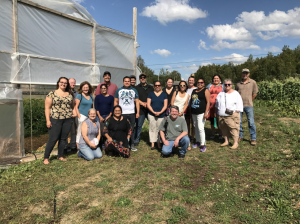The Institute for Tribal Environmental Professionals (ITEP) at Northern Arizona University received a five-year, $3.2 million grant from the Bureau of Indian Affairs (BIA) to continue its work assisting and preparing tribes to adapt to climate change.
The grant funds the work of a cooperative agreement that builds on an ongoing effort by ITEP’s Tribes & Climate Change program (TCC) and the BIA to support tribal governments with training and resources to build and develop communities that are resilient in the face of a changing climate. Much of the work for co-managers Nikki Cooley and Karen Cozzetto is providing training and technical assistance to tribes as they research and write climate adaptation plans (CAPs).
This effort is especially critical now because tribes and Indigenous peoples of North America are disproportionately impacted by the impacts of climate change due to lack of infrastructure, income disparity and being located far from emergency services, according to the UN’s Intergovernmental Panel on Climate Change (IPCC). They also are among the most vulnerable groups, since subsistence resources, such as medicinal plants, animals and freshwater springs, are often negatively affected by climate change, and as such, diminish and impact tribal lifeways and cultural practices.
“The work by NAU and our partner organizations surrounding environmental change is critical to the empowerment and resilience of Indigenous and Native American communities,” NAU President Rita Cheng said. “I am pleased the Bureau of Indian Affairs recognizes the importance of the Institute for Tribal Environmental Professional’s research and outreach.”
This grant will help fund workshops that ITEP does to help tribes and peoples adapt to the changes in their environment. In these workshops, the TCC provides a road map for tribes, tribal leaders and Indigenous peoples to develop their own CAPs while also leaving enough flexibility so tribes can account for regional climate impacts and cultural practices to formulate a plan that meets their specific needs.
Thus far, those workshops have been successful. Kenneth Weitzel of the Tlingit and Haida Tribe is one success story. He began researching the effects
“For tribes, nature is no different than culture; it is one and the same,” Cooley said. “If one aspect is impacted, then that heavily impacts a tribe’s way of life whether that’s through song, prayer or having a plant or animal available for traditional ceremonies.”
In the past, tribal leaders and members have lamented that they often felt stuck or overwhelmed, with only a single person responsible for the plan development. In order to better serve tribal partners while developing CAPs, TCC program staff created an advanced course that facilitates cohorts of tribes for 18 months. Each tribe sets a specific goal for making adaptation planning progress during that time frame. The first set of cohorts launched in fall 2018, and the next group of cohorts will begin in Fall 2020.
“Our services are needed because the science is constantly being updated and there are more and more resources out there to understand,” Cooley said. “I think we’ve had a really positive impact in that tribes are better equipped to start or finish their CAPs for their respective tribes.”
Since the program began in 2009, staff have worked with more than 650 tribal representatives from more than 255 tribes. This sometimes requires traveling to remote areas to serve tribes who are the most isolated from the resources needed to author a CAP. ITEP’s travels and partnerships with tribes span far and wide, including the Yurok Nation in northern California, the Navajo Nation in Arizona, the Swinomish Indian Tribal Community in Washington, Quapaw Nation in Oklahoma, the Aroostook Band of Micmac Indians in Maine, the Copper River Native Association in Alaska and many others.
Cooley and Cozzetto also have developed and work closely with a Climate Change Advisory Committee (CCAC) consisting of tribal, academic and federal partners. The CCAC consists of six tribal representatives, six federal agency representatives and eight tribal resilience liaisons from throughout the country. Together, they help inform ITEP’s work and collaborate to leverage resources and technical expertise to advance tribal climate change resiliency efforts nationally. Members of the CCAC will often work with ITEP as instructors at training courses or help develop webinars on climate science. The work with the CCAC is fluid and driven primarily by the priorities and needs of tribes.

“We’ve worked hard over the years to develop strong collaborative partnerships with tribes and our federal partners, and that hard work has led to ITEP being recognized as the leading organization in the U.S. in training tribal nations on climate change adaptation with adherence to traditional knowledge,” ITEP Executive Director Ann Marie Chischilly said. “Our climate change efforts are also getting attention and interest from Indigenous peoples globally.”
The TCC program also will use funding from this grant to host a conference focused exclusively on tribal climate concerns—the first of its kind in the country. The National Tribal & Indigenous Climate Conference will take place Aug. 31-Sept. 4 and will occur every two years thereafter. The conference is open to all U.S. tribal nations and Indigenous people throughout the world and will bring together federal, academic and tribal partners who are tackling climate change assessment, adaptation and mitigation measures.
“A lot of the work we do is bring people together so tribes don’t feel like they are facing climate change challenges alone,” Cozzetto said. “We are fortunate to work with an array of partners who focus on action and celebrate success.”
Learn more about the Tribes & Climate Change Program and the upcoming National Tribal & Indigenous Climate Conference.



